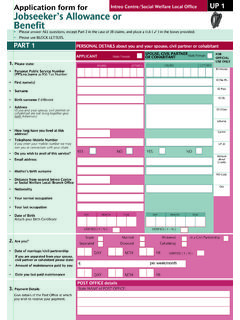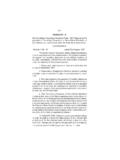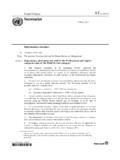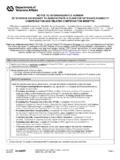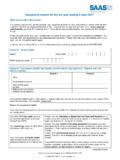Transcription of Tax Breaks – What you can claim
1 Taxpayers Australia Inc. Taxpayers Australia 2005 Tax Breaks what you can claimAs a general rule employees are entitled to claim deductions for expenses they haveincurred in earning their assessable income. The exception to that rule is that anyexpenditure that is of a capital nature, eg a computer, cannot be claimed outright butthe taxpayer may be entitled to claim a deduction for depreciation based on the workrelated usage of that be entitled to claim deductions the employee must have receipts or otherdocumentary evidence to prove they spent the money. Receipts must contain thefollowing information Name of the supplier; Nature of the goods or services purchased; The day the expense was incurred (or paid); and The day the receipt or document was made the nature of the goods is missing from the receipt then taxpayers are allowed towrite in the missing details before they lodge their tax returns.
2 If the day theexpense was incurred (or paid) is missing then you can use a bank statement or creditcard statement to show when it was and other documentary evidence must be retained for 5 years from the dayyou lodge your income tax return. The Tax Office can audit you re tax affairs longafter you have received your tax assessment. Failure to retain the receipts or otherdocumentary evidence can mean loss of the deduction, plus penalties (at a flat 25% ormore), plus interest on a compounding basis (the current rate is approx 12% perannum).Many taxpayers fail to claim their correct entitlements and as a consequence they paytoo much tax. Follow the general rules outlined above and use the guidelines belowto work out what deductions you can clothingClaims for work-related clothing are deductible.
3 Claims for cleaning or maintainingwork-related clothing are also deductible. Clothing falls into five separate categoriesof which only three are clothing, Occupational specific clothing and Compulsory uniforms andnon-compulsory are deductible. Conventional clothing is not deductible. Protective clothingTo qualify for a deduction under this category the clothing must be protective and itmust protect the person from the risk of illness or injury. Protective clothing mustreduce the risk of death, injury or illness. That includes any aggravation,acceleration or recurrence of any illness whether or not that illness is Australia Inc. Taxpayers Australia 2005 For example, clothing worn by food preparers and heavy duty overalls used by metalworkers would qualify as protective that protects other clothing or artificial limbs or other surgical appliancesfrom loss, damage or destruction is also deductible.
4 This would include dust coatsand other types of overalls that are worn over conventional for special clothing and equipment are also available for taxpayers that arerequired to work in the natural environment eg outdoor workers. Claims aredeductible for sunglasses, wet weather gear, umbrellas and thermal underwearprovided the worker works outside for a significant period of time and is exposed tothe footwear is also deductible. This includes steel capped boots, rubberboots and special non-slip shoes. Running shoes or other conventional footwear isnot allowable. Occupational specificClothing that is occupational specific eg nurse s traditional uniform, cleric s robes,chef s checked pants and protective headwear hats are clothing worn by retail staff or waiters etc would not be deductible.
5 Compulsory uniformsThe cost of corporate uniforms and wardrobes are deductible provided. Thisincludes distinctive clothing that has the employer s logo prominently displayed andthe compulsion to wear the uniform is strictly enforced. To be deductible under thiscategory the garment must be distinctive and peculiar to the types of clothing that is deductible includes shirts, ties, pants, jackets, dresses,trench coats, shoes, handbags etc if they bear the distinguishing features such ascorporate identifier or logo. Non-compulsory uniformsCheck with your employer to see if a registration has been approved by theDepartment of Industry Science and Resources. Where that applies then claims maybe deductible. Conventional clothingClaims for conventional or everyday clothing are not deductible.
6 That appliesregardless of whether the employer expects a certain standard of dress. For examplea suit worn by an office worker would not be cost of laundry and or maintenance expenses is deductible provided the cost ofproviding the clothing is expensesTaxpayers Australia Inc. Taxpayers Australia 2005As a general rule travel between your home and your place of employment is notdeductible as it is a private expense, however the following types of travel aredeductible The employee works from home (ie the home is their place ofemployment and they travel to other places of employment; The taxpayer s employment effectively starts before leaving home (egconsultant who services clients from home by telephone); Taxpayer is required to travel to a destination other than their primaryplace of employment (eg home to airport for interstate travel, travel toa branch office or site).)
7 Taxpayer is required to transport bulky equipment between home andwork (eg builder or plumber that moves to different sites); A break in the journey is needed for employment duties (eg servicing aclient on the way to the primary place of employment); and Travel between two places of employment, between a place ofemployment and a place of business or between two places receipt of a travel allowance from an employer does not mean that a deductioncan be claimed. To be entitled to a deduction the journey itself must taxpayers receive an award transport allowance from their employer. Thegeneral rule is that those allowances form part of their assessable income and travelclaims are only deductible if they satisfy one of the situations listed the journey satisfies the rules than claims can be made for trips made by car,plane, tram, train, taxi or any other mode of transport for cost are General deductionsThe following deductions are available to all taxpayers provided they are used as partof the income earning activities.
8 How much of the expense is deductible dependson the extent that the taxpayer uses that expenditure in their income earning activities- Donations of $2 or more to approved charities and other Gift deductiblerecipients. Gifts to political parties is limited to $100 Bank charges (deductible provided the account earns interest or is aninvestment account. Debits tax (BAD) is deductible provided the withdrawalis also deductible) Calculators and electronic organizers Conference, seminars and training courses (includes the cost of the course plusany travel expenses). The course must be related to the person s incomeearning occupation First aid course (provided the person is the designated first aid person) Gifts (see donations Protective clothing (includes the cost of buying and the cost of laundry, repairand maintenance see Work-related clothing) Compulsory and non-compulsory clothing (includes cost of buying and thecost of laundry, repair and maintenance see Work-related clothing)Taxpayers Australia Inc.)
9 Taxpayers Australia 2005 Overtime meals (provided paid under an award overtime meal allowance) Income continuance insurance Parking fees and tolls (provided the cost of the trip is deductible see Travel) Professional association fees Union fees Protective equipment (including harnesses, goggles, safety glasses, breathingmasks, helmets, steel capped boots Sunscreens, sunglasses and wet weather gear (provided the person is requiredto work outdoors Car expenses (provided the trip is deductible see Travel) Fares including taxis, trains busses and trams (provided the trip is deductible see Travel) Home office expenses including cost of heat light and power plus depreciationof equipment (an area or room must be specifically set aside and used forwork purposes) Insurance of tools and equipment Telephone calls used for work purposes Telephone rental (but only if person is on call ) Transport costs (see Travel) Interest on income earning investments Tools and equipment used for income earning purpose (if cost is $300 or less) Depreciation on tools and equipment used for income earning activities(applies if the cost is more than $300) Computers and software used for income earning purpose (depreciate over if cost more than $300)))
10 The following expenses are not deductible regardless of the person s occupation Cost of acquiring and renewing a standard driver s licence Bribes of government officials Home occupancy expense including interest, insurance, rates and taxes (unlessthe taxpayer is operating a separately identifiable business from home) Removal and relocation expenses Social functions (regardless of whether attendance is compulsory) Child care fees Club membership fees Conventional clothing Employment agreements with new employer (existing employer is deductible) Fines Grooming Meals eaten during normal working hours (unless traveling overnight for workpurposes) Newspapers Glasses and contact lenses Sports clubs fees Superannuation contributions (deductions are allowed for self employedpersons and those employees not entitled or not receiving employer support) Telephone installation cost Silent number (telephone)Taxpayers Australia Inc.
